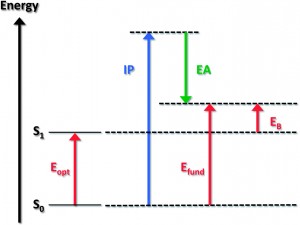Materials Horizons Advisory Board member, Jean-Luc Brédas, is the author of the journal’s first Focus article, Mind the gap! Focus articles are educational pieces, intended to explain or clarify topics relevant to the understanding of materials science. In his article, Professor Brédas seeks to clear up the confusion surrounding the many types of energy gap relevant to organic materials, and calls for a more rigorous use of the appropriate terminology. Here we find out more about the author, and why he chose to write this article for Materials Horizons.
 Jean-Luc Brédas is Regents’ Professor of Chemistry and Biochemistry at Georgia Institute of Technology. He began his research career at the Université de Namur, Belgium, where he completed a Ph.D. in Theoretical Chemistry. Since then, he has held positions at Université de Mons, Belgium, the University of Arizona, USA, and King Abdulaziz University in Saudi Arabia. He is the author or co-author of over 950 scientific papers and has presented over 500 invited talks at scientific meetings and seminars.
Jean-Luc Brédas is Regents’ Professor of Chemistry and Biochemistry at Georgia Institute of Technology. He began his research career at the Université de Namur, Belgium, where he completed a Ph.D. in Theoretical Chemistry. Since then, he has held positions at Université de Mons, Belgium, the University of Arizona, USA, and King Abdulaziz University in Saudi Arabia. He is the author or co-author of over 950 scientific papers and has presented over 500 invited talks at scientific meetings and seminars.
Professor Brédas has been awarded numerous prizes in recognition of his work, including the Triennal Prize of the Royal Society of Chemistry, Belgium, (1991), the Francqui Prize (1997), the Descartes Prize of the European Commission (2003) and the Georgia Institute of Technology Outstanding Faculty Research Author Award (2008). In 2013, he received the American Physical Society David Adler Lectureship Award in Materials Physics. He has been a Fellow of the Royal Society of Chemistry since 2008.
The research activities of Professor Brédas’ group are focused on the computational characterization and design of novel organic materials of relevance for organic electronics and photonics.
What was the motivation to write your Materials Horizons Focus article?
There were two major reasons: The first is the original concept behind these Focus articles, which I believe is unique to Materials Horizons. The second is that many of my colleagues and myself were becoming increasingly frustrated by the lack of rigor surrounding the use of common terminologies in materials research articles, in particular with regard to energy gaps and energy levels in electro-active organic materials. Hence, when Seth Marder came to me with a proposition to write such a Focus article, he met no resistance!
At which upcoming conferences may our readers meet you?
In the spring, I’ll participate in SPIE Photonics West in San Francisco, the ACS National Meeting in Dallas, and the MRS Spring Meeting (again in San Francisco).
How do you spend your spare time?
Soccer, or should say much more appropriately football, is my main passion besides science. I still try to play as much as I can especially with my students. Also, I very much enjoy tending to the four fish tanks I have at home, with fish (cichlids) mainly from the Central Africa Lakes: Tanganyika and Malawi.
Which profession would you choose if you were not a scientist?
This is a tough question because I cannot picture myself doing something else really. The fulfillment that scientific research, teaching students, and making friends all over the world bring, would be in my mind very difficult to match. But to answer the question, maybe I’d like to be in the sports business, for instance as a commentator.
Jean-Luc Brédas
Mater. Horiz., 2014, 1, 17-19
DOI: 10.1039/C3MH00098B
‘The energy gap is a critical material parameter. Here, we illustrate the concepts behind the various flavors of energy gaps relevant for organic materials and call for a more consistent use of appropriate terminologies and procedures.’
Follow the latest journal news on Twitter @MaterHoriz or go to our Facebook page.











